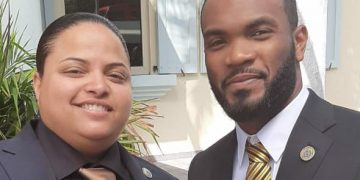PHILIPSBURG – Monday, August 10th marked six months since the sitting Parliament was sworn in. Among the returning and new faces are Party for Progress (PFP) Members of Parliament (MPs) Melissa Gumbs and Raeyhon Peterson. Six months into their new roles, the two MPs took a few moments to reflect on the time spent so far and offered their thoughts on some key topics facing the country.
On Being in Parliament
Having experienced St. Maarten’s political arena before being elected in their own ways, both MP Gumbs and MP Peterson were somewhat prepared for the experience of being in Parliament. However, with the COVID-19 pandemic requiring a country lockdown in March, Parliament found itself in the unique position of having to now conduct Parliament business over the online meeting platform Zoom. While this has been happening since March with little to no hiccups, both MPs look forward to Parliament returning to the legislative hall.
Both MPs are looking forward to seeing more topics come to the floor of Parliament that touch directly on peoples’s quality of life and seeing the focus return to the business and productivity of Parliament.
“There have been many emotional weeks since COVID became a reality for us,” Peterson said. “But our focus as Parliament must remain clear and must remain on what the business of Parliament actually is. We’ve heard a lot of rhetoric about Parliament reserving the right to question anyone it wants to but that is just a show of disrespect for the separation of powers (Trias Politica) and for democracy as a whole. Not everyone reports to Parliament. It is something we will continue to be vocal about, regardless of the criticism we may face.”
On COVID-19 & Its Impact on Sint Maarten
Both PFP MPs have repeatedly expressed their concern for two significant areas impacted by COVID-19: education and food security. In a recent public meeting of Parliament, Gumbs questioned the Minister of Education, Culture, Youth & Sport Rodolphe Samuel about the state of the digital infrastructure at all public schools, as well as the Ministry’s plans to handle those students who do not have a device, in-home internet, or both.
“COVID forced everyone to rethink not only how we do business, but most importantly, how we learn. This is the second crisis opportunity we have had to change how we do things. We shouldn’t waste it again.”
Aside from education and food security, the MPs we need to plan ahead for the future as well. “COVID has also shown us that diversifying our economy have to become one of the top priorities,” Gumbs added. “Whether it’s through agriculture or any other endeavor, the government needs to prioritize putting the legislation and manpower in place to start this trajectory.”
On the Proposed Entity
Gumbs and Peterson joined their colleagues in rejecting the proposed Kingdom law for a reform entity in its current form by way of a motion passed on 8 July 2020. Each MP shared concerns over several overreaching articles within the entity’s structure that they did not believe were in the best interest of Country St. Maarten. The motion’s second resolution also requested the Government to issue a counterproposal to the Kingdom Government to find ways and means wherein the entity could better reflect the needs and realities of the country. The MPs believe that aside from solely motioning the government to take action, Parliament should also explore all the tools given to them in our Constitution to fight this common battle on a Kingdom level.
“Lack of communication has played a big role, especially since the beginning of the pandemic. Not only from government to Parliament, but also on a Kingdom level. Egoism, alongside emotional reactions, instead of proactive and proper planning, has been the order of the day,” Gumbs said.
On Government
The MPs have spoken about improved prioritization being an avenue out of the pandemic. they believe this has to start with personnel, and strengthening the human resources of key areas in government to execute plans and projects. Restructuring, by increasing capacity in some areas while decreasing in others, is definitely needed, they believe, to allow all tasks as prescribed in the law to be executed, such as at the tax office.
“Key revenue-generating departments are not reinforced with the proper amount of people and the right tools. This keeps our compliance low across several disciplines, and if we want to stop depending on other countries to support us in times of crisis, we have to start fixing our own state of affairs first,” Peterson said. “This means making some uncomfortable, but necessary decisions.”
On the state of the Kingdom
The faction reflected on the current state of the relationship between the Kingdom partners. It’s no secret that the relationship between the three smaller autonomous countries and the Netherlands is strained. Often it is felt that the autonomy of the countries is being affected by the actions of the Netherlands. A motion has been passed to address this subject, but PFP did not vote for the content of the motion.
“The finalization of the decolonization process is not the short-term solution the people of Sint Maarten need at this moment,” according to Peterson. “Our own Constitution and Kingdom Charter give us, as Parliament, a say in these matters, and we need to utilize all of the tools given to us within our own laws before bringing it the United Nations or we’ll be very embarrassed at that point. Communication is key, if a real solution is what we are looking for.”


















